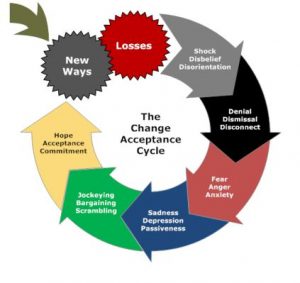So. Your favorite boss was recruited to work somewhere else. Next thing you know, there’s a new Sheriff in town and you know next to nothing about this person except that they’re different and your world seems turned upside down!
They do things different. Their personality is not the same. They don’t seem as approachable! They like to do things a different way. The trust you shared with your old boss is now met with with questions like “Why do we do it THAT way?” You and your colleagues are nervous. Everyone seems to be walking on eggshells as they try to figure the new boss out.
Part of your emotional reaction is purely ego-driven and and tainted with a bit of anger. “They haven’t been here as long as me! I know a lot more about this company then they do! How dare they question what I’m doing!”
Part of your reaction is fear: “Are they going to make changes? Am I safe? Do they trust me? Are they going to see through me and realize I’m not as smart as I think I am?”
But ultimately, you are also sad. Sad for the loss of the way things used to be. Sad for the loss of your former boss. Sad that all your hard work and accomplishments don’t seem as significant any more.
I MISS THE WAY IT USED TO BE!!!
And of course you and all of your colleagues seem to be sucking up to the new person to try and get on their ‘good’ side and be seen as a favorite.
These kind of common work-disruption scenarios play out all the time. Whether it be a boss-change, a merger with another company, a reorganization of a department or a new reporting structure. Most of the time you feel completely helpless. You weren’t involved in the decision but you are now thrown into what seems like utter chaos.
For many people, the change is just too great. They might be too set in their ways. They might feel that the change is just too out of their comfort zone. The combination of anxiety, fear, sadness, anger and frustration leads them to immediately begin searching for a new opportunity.
But here’s the thing: when there is a major disruption that affects you so deeply, there is also an intense opportunity for growth.
Do you really think your new boss is simply a power-hungry, nincompoop with no skills or talent for their new job? Most likely they are also experiencing similar feelings of insecurity, anxiety, and fear and as a result are looking for trusted partners to help them, not naysayers who are trying to undermine them.
 But it is important to acknowledge that the emotions associated with disruption are real.
But it is important to acknowledge that the emotions associated with disruption are real.
As the illustration to the left demonstrates, their are common stages when their are big changes that impact an organization. The reactions you go through are normal although everyone deals with disruption differently and at different times. While initially, you may experience feelings ranging from helplessness and disorientation to anger and sadness, ultimately, there’s great opportunity (and adventure) awaiting you as you work through the disruption and position yourself as a trusted partner and team member keeping your eye on the same goal of success as your new boss and ultimately, the organization.
Find ways to have open and frank discussions with your team and your new boss about the changes that are occurring. Start to think differently about your approach and ways that your experiences and understandings of your organization can be helpful to your new boss and to the change that is occurring. Sometimes during big disruptions, you will feel as if you are giving up your own power or sense of ownership relating to your job or assignments, but in fact, if you keep an open mind and truly approach the change with a sense of new opportunity and adventure, you can experience new growth and gain new skills and responsibilities.









